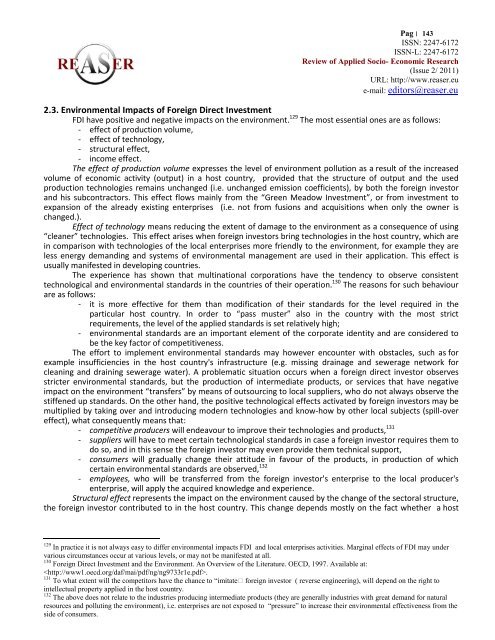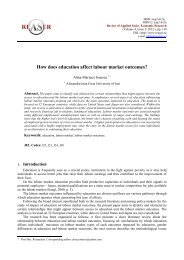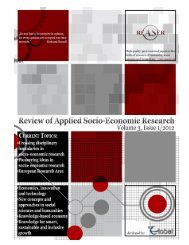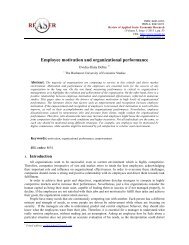Pag׀ 142 ISSN: 2247-6172ISSN-L: 2247-6172<strong>Review</strong> <strong>of</strong> <strong>Applied</strong> <strong>Socio</strong>- <strong>Economic</strong> Research(Issue 2/ <strong>2011</strong>)URL: http://www.reaser.eue-mail: editors@reaser.euenvironment. On the other hand, higher incomes <strong>of</strong> the population create good conditions forenhancing pressure on the environmental quality improvement. In this connection we have tomention that decline in pollution, which Kuznets. S. justifies by the increased incomes 124 , was besidesother factors caused by the globalization process. In developed economies it opened space forrestructuring their economies towards transition from highly environmentally demanding productionsto less demanding ones.- Legislation applied to the environment can be environmentally effective and thus negatively orpositively influence the environmental quality.Strict environmental legislation may negatively impact the economy in the sense that the investors willmove to other countries, namely to those ones, which in the effort to attract investors “s<strong>of</strong>ten theenvironmental legislation. Globalization process so theoretically gives way to transfer <strong>of</strong> pollution from onecountry to another, while the volume <strong>of</strong> pollutants in the global environment system remains unchanged. On thecontrary, as a result <strong>of</strong> a more distinct economic growth in the investor's host country and the consequentincrease in the income <strong>of</strong> the population, the levels <strong>of</strong> pollutants may rise.2. 2. Foreign direct investment, its positive and negative impact on the environmentAccording to internationally acknowledged definition by the International Monetary Fund 125 , FDIrepresents a category <strong>of</strong> international investment which reflects the goal <strong>of</strong> the residential subject <strong>of</strong> oneeconomy (direct investor) 126 to acquire a permanent share in the company with its seat in other economy (directinvestment enterprise). The existence <strong>of</strong> a long-term relationship between a direct investor and an enterprise inthe host country and a considerable degree <strong>of</strong> the investor's influence on the management <strong>of</strong> the particularenterprise is anticipated (“long-term interest”).FDI has positive impact on the economic growth and development <strong>of</strong> the host country: growth <strong>of</strong> GDP,drop <strong>of</strong> the unemployment rate, increase in export efficiency with positive impact on the balance <strong>of</strong> payments,increase in tax revenues, stimulation <strong>of</strong> infrastructure development, growth <strong>of</strong> the production potential <strong>of</strong> thecountry and labour productivity (resulting from transfer <strong>of</strong> new technologies, know-how, work and managerialmethods, knowledge and skills), improvement <strong>of</strong> business environment and business ethics, involvement <strong>of</strong> localcompanies in subcontracting (so-called “crowding in” effect), growing competition and competitiveness <strong>of</strong> thecompanies and stimulation <strong>of</strong> innovations.Some <strong>of</strong> the negative impacts <strong>of</strong> FDI inflows on the host country's economy are as follows: elimination <strong>of</strong>competition through acquisition <strong>of</strong> the company in the host country with the objective to lower or wind up itsproduction, “crowding out” the producers that are unable to compete <strong>of</strong>f the market (so-called “crowding out”effect) 127 , increase in the unemployment rate resulting from the application <strong>of</strong> top technologies, deterioration <strong>of</strong>the balance <strong>of</strong> payments as a result <strong>of</strong> prioritization <strong>of</strong> foreign subcontractors, or repatriation <strong>of</strong> pr<strong>of</strong>its, unequalcompetition between enterprises in foreign ownership and domestic enterprises due to selectiveness ininvestment incentives, or possible transfer <strong>of</strong> outdated technologies, which cannot be used in the foreigninvestor's country because they do not meet the environmental standards.With regard to the importance the FDI gained during the last decades, 128 it is necessary to investigate theirimpacts on the environment. An important share <strong>of</strong> FDI, mainly in developing countries, is explicitly directed tosectors which considerably burden the environment. In addition, right in current period <strong>of</strong> the global financial andeconomic crisis, the world-wide decline in FDI may account for a serious problem in many developing countries,because FDI are their main external source <strong>of</strong> gaining capital. In this context, it is important that the countries, intheir effort to attract foreign investors, should consider not only economic but also environmental aspects <strong>of</strong> thisprocess.124 KUZNETS, S.: Modern <strong>Economic</strong> Growth: Rate, Structure and Spread. New Haven, Conn.: Yale University Press, 1966.125 Balance <strong>of</strong> Payments Manual. IMF, 1993. Available at: .126 Direct investor can be for example an individual or a group <strong>of</strong> individuals, public or private enterprise, or a group <strong>of</strong> mutually interlinkedenterprises, government or governmental unit, syndicate or other consortium <strong>of</strong> companies, or any combination <strong>of</strong> the above options.127 On the other hand, this process has a positive influence on the overall effectiveness <strong>of</strong> the economy.128 While in 1982 FDI flow achieved “only”” the sum <strong>of</strong> $ 58 billion USD, in 1990 it was $ 207 billion USD and in 2007 a bumper $ 1,979 billion USD.More details in: Romančíková, E.: Finančno-ekonomické aspekty ochrany životného prostredia. Bratislava: ECO INSTRUMENT, 2004.ISBN 80-967771-1-4.
Pag׀ 143 ISSN: 2247-6172ISSN-L: 2247-6172<strong>Review</strong> <strong>of</strong> <strong>Applied</strong> <strong>Socio</strong>- <strong>Economic</strong> Research(Issue 2/ <strong>2011</strong>)URL: http://www.reaser.eue-mail: editors@reaser.eu2.3. Environmental Impacts <strong>of</strong> Foreign Direct InvestmentFDI have positive and negative impacts on the environment. 129 The most essential ones are as follows:- effect <strong>of</strong> production volume,- effect <strong>of</strong> technology,- structural effect,- income effect.The effect <strong>of</strong> production volume expresses the level <strong>of</strong> environment pollution as a result <strong>of</strong> the increasedvolume <strong>of</strong> economic activity (output) in a host country, provided that the structure <strong>of</strong> output and the usedproduction technologies remains unchanged (i.e. unchanged emission coefficients), by both the foreign investorand his subcontractors. This effect flows mainly from the “Green Meadow Investment”, or from investment toexpansion <strong>of</strong> the already existing enterprises (i.e. not from fusions and acquisitions when only the owner ischanged.).Effect <strong>of</strong> technology means reducing the extent <strong>of</strong> damage to the environment as a consequence <strong>of</strong> using“cleaner” technologies. This effect arises when foreign investors bring technologies in the host country, which arein comparison with technologies <strong>of</strong> the local enterprises more friendly to the environment, for example they areless energy demanding and systems <strong>of</strong> environmental management are used in their application. This effect isusually manifested in developing countries.The experience has shown that multinational corporations have the tendency to observe consistenttechnological and environmental standards in the countries <strong>of</strong> their operation. 130 The reasons for such behaviourare as follows:- it is more effective for them than modification <strong>of</strong> their standards for the level required in theparticular host country. In order to “pass muster” also in the country with the most strictrequirements, the level <strong>of</strong> the applied standards is set relatively high;- environmental standards are an important element <strong>of</strong> the corporate identity and are considered tobe the key factor <strong>of</strong> competitiveness.The effort to implement environmental standards may however encounter with obstacles, such as forexample insufficiencies in the host country's infrastructure (e.g. missing drainage and sewerage network forcleaning and draining sewerage water). A problematic situation occurs when a foreign direct investor observesstricter environmental standards, but the production <strong>of</strong> intermediate products, or services that have negativeimpact on the environment “transfers” by means <strong>of</strong> outsourcing to local suppliers, who do not always observe thestiffened up standards. On the other hand, the positive technological effects activated by foreign investors may bemultiplied by taking over and introducing modern technologies and know-how by other local subjects (spill-overeffect), what consequently means that:- competitive producers will endeavour to improve their technologies and products, 131- suppliers will have to meet certain technological standards in case a foreign investor requires them todo so, and in this sense the foreign investor may even provide them technical support,- consumers will gradually change their attitude in favour <strong>of</strong> the products, in production <strong>of</strong> whichcertain environmental standards are observed, 132- employees, who will be transferred from the foreign investor's enterprise to the local producer'senterprise, will apply the acquired knowledge and experience.Structural effect represents the impact on the environment caused by the change <strong>of</strong> the sectoral structure,the foreign investor contributed to in the host country. This change depends mostly on the fact whether a host129 In practice it is not always easy to differ environmental impacts FDI and local enterprises activities. Marginal effects <strong>of</strong> FDI may undervarious circumstances occur at various levels, or may not be manifested at all.130 Foreign Direct Investment and the Environment. An Overview <strong>of</strong> the Literature. OECD, 1997. Available at:.131 To what extent will the competitors have the chance to “imitate foreign investor ( reverse engineering), will depend on the right tointellectual property applied in the host country.132 The above does not relate to the industries producing intermediate products (they are generally industries with great demand for naturalresources and polluting the environment), i.e. enterprises are not exposed to “pressure” to increase their environmental effectiveness from theside <strong>of</strong> consumers.








